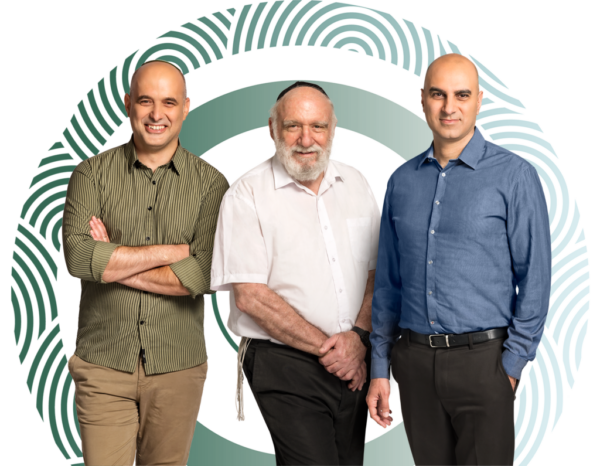Fulfilling Ben-Gurion’s Dream
Faculty of Exact Sciences The Energy and Sustainability Center
The National Institute for Energy Research
Fulfilling Ben-Gurion’s Dream
David Ben-Gurion once declared that the survival of Israel depended on three things: security, access to water, and independence in energy. Thanks to Bar-Ilan’s unparalleled excellence in national energy research, the Jewish state is getting closer to achieving this dream.
Shortly after winning, together with the Technion – Israel Institute for Technology, a $37 million contract to establish the state’s first National Institute for Sustainable Energy (NISE) in 2023, Bar-Ilan began construction on the institute’s centerpiece: a first-of-its-kind energy prototype lab, slated to open in the coming months. According to NISE leaders and Bar-Ilan Profs. Lior Elbaz and Malachi Noked of the Department of Chemistry, however, that date can’t come soon enough. “We’ve already been inundated with inquiries from startups who want to build and evaluate early versions of their products,” says Elbaz, who, together with Noked, published more than 50 papers in scientific journals last year alone. “But in truth, the lab will be beneficial to both parties: Companies can use our research to improve their solutions, and we can improve our research through a deeper understanding of what energy companies really need.”
At first blush, it would seem that Elbaz and Noked are more than familiar with the challenges faced by industry: Elbaz’s own technology for emissions-free energy storage—a proprietary liquid hydrogen carrier that enables the efficient, long-distance transportation of hydrogen—is the basis for Refhuel, a green-tech startup founded in 2022. Meanwhile, his work on PGM-free catalysts, key to the energy-converting process in fuel cells, is helping drive new advances in industrial R&D. For his part, former Krill Prize winner Noked is a national and international leader in the development of thin protective films for energy-storage materials, which open the door to new, clean electrochemical devices from sensors to purification systems to batteries. His research on all-solid-state lithium batteries (ASSLBs), which hold the potential to improve energy density, safety, and battery lifetime compared to traditional liquid electrolyte batteries, was also published in nature nanotechnology last year.
In addition to their academic success, however, both researchers are eager to connect with industry players in the clean-energy space. “Electrochemist Prof. (emeritus) Doron Aurbach, who heads the NISE together with Prof. Yoed Tsur from the Technion, has declared it as a goal to make Israel a global pioneer in successfully addressing the climate crisis,” says Elbaz. “Achieving that goal will require an entire ecosystem, and that is exactly what we plan to build.”

From left to right: Prof. Malachi Noked, Prof. (emeritus) Doron Aurbach, and Prof. Lior Elbaz.
Building Scientific Bridges: The BIRD Grant
On account of their successful study of all-solid-state lithium batteries (ASSLBs), Prof. Malachi Noked and his cohort of international colleagues were awarded a $3 million, two-year BIRD (U.S.-Israel Binational Industrial Research and Development) grant to advance their research together with Forge Nano, a Colorado-based materials science company pioneering the use of a proprietary nanocoating technology.